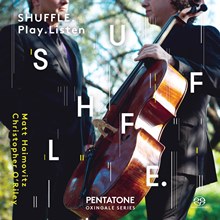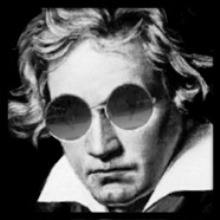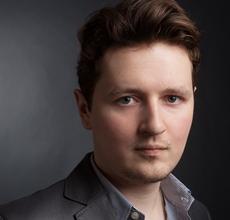 The Azrieli Music Project (AMP) is proud to announce that composer Wlad Marhulets is the winner of the inaugural Azrieli Prize in Jewish Music for his Klezmer Clarinet Concerto. Marhulets, who submitted a completed orchestral work on a Jewish theme or subject – along with applicants from around the world – has been granted the second of two $50,000 prizes, which were offered for the first time by the Azrieli Foundation. Dr. Sharon Azrieli Perez, noted operatic soprano and scholar in Jewish and cantorial music, created the new prize in 2015 to bring new Jewish music into the world. In September 2015, the Azrieli Music Project announced that Brian Current was the winner of the inaugural Azrieli Commissioning Competition for Canadian composers. Marhulets’s 2009 concerto and Current’s newly created work, The Seven Heavenly Halls, will both be performed at the Azrieli Music Project Inaugural Concert by Orchestre symphonique de Montréal and Maestro Kent Nagano on Wednesday, October 19, 2016 at Maison symphonique de Montréal.
The Azrieli Music Project (AMP) is proud to announce that composer Wlad Marhulets is the winner of the inaugural Azrieli Prize in Jewish Music for his Klezmer Clarinet Concerto. Marhulets, who submitted a completed orchestral work on a Jewish theme or subject – along with applicants from around the world – has been granted the second of two $50,000 prizes, which were offered for the first time by the Azrieli Foundation. Dr. Sharon Azrieli Perez, noted operatic soprano and scholar in Jewish and cantorial music, created the new prize in 2015 to bring new Jewish music into the world. In September 2015, the Azrieli Music Project announced that Brian Current was the winner of the inaugural Azrieli Commissioning Competition for Canadian composers. Marhulets’s 2009 concerto and Current’s newly created work, The Seven Heavenly Halls, will both be performed at the Azrieli Music Project Inaugural Concert by Orchestre symphonique de Montréal and Maestro Kent Nagano on Wednesday, October 19, 2016 at Maison symphonique de Montréal.
Wlad Marhulets (b. 1986) describes his Klezmer Clarinet Concerto as the most important work of his career. Born in Minsk, Marhulets moved with his family to Gdansk, Poland, as a child. It was there, at the age of 16, that he first heard a recording by the acclaimed klezmer clarinetist David Krakauer. “Listening to this modern reinvention of klezmer music changed my life,” says Marhulets, who immediately picked up the clarinet and formed his own klezmer band. Before travelling to New York City, with the goal of meeting Krakauer, the twenty-year-old composer – who barely spoke a word of English – also sent his compositions to John Corigliano. The Oscar- and Pulitzer Prize-winning composer immediately took Marhulets under his wing at the Juilliard School. Marhulets’s Klezmer Clarinet Concerto was premiered by David Krakauer and the Detroit Symphony Orchestra in 2009, under the baton of Maestro Andrew Litton. The concerto has since been performed by the National Orchestra of Lyon and the Bialystok Symphony in Poland.
“The discovery of Jewish music as a teenager truly turned my life around,” comments Marhulets. “It inspired me to become a musician and to explore my own roots and culture through music. Since then, I’ve been trying to give back by writing music that is primarily inspired by Jewish culture. I’m thrilled and honoured to be the winner of the Azrieli Prize and I could not be more grateful to the Azrieli Foundation. I can’t wait to hear the concerto performed by the Orchestre symphonique de Montréal and Maestro Nagano!”
Dr. Sharon Azrieli Perez comments, “I am truly delighted by the jury’s choice for the inaugural Azrieli Music Prize, which was selected amongst applications from across the globe and from composers of all ages, affiliations and faiths. The Klezmer Clarinet Concerto is a dynamic work that is entirely modern, yet hearkens back to traditional Jewish music. In Wlad Marhulets, we have a young composer who is poised for a major career.” The jury for both Azrieli Music Project prizes consisted of conductor Boris Brott; composer Aaron Jay Kernis; musicologist Neil Levin; conductor and composer Steven Mercurio; and composer Ana Sokolović.
Now based in Los Angeles, Wlad Marhulets has been gaining great acclaim as both a concert and film composer. Marhulets has composed music for such films as The Orchestra of Exiles (an acclaimed documentary about the creation of the Israel Philharmonic Orchestra, directed by Oscar nominee Joshua Aronson), The Giver, The November Man, and Sabotage, among others. His notable concert works include The Property, a “Klezmer Opera” commissioned by Lyric Opera of Chicago; the oratorio Return, written for the beginning of the Polish Presidency in the European Union; and the string quartet “Dybbuk,” written for the JACK Quartet, and also performed by the Kronos Quartet. Marhulets has received the Susan W. Rose Fund Grant, the Peter D. Faith Prize, and five ASCAP Awards, including the prestigious Leonard Bernstein Award. He is currently working on a symphonic piece commissioned by the Festival of Jewish Culture in Krakow, to be performed this June.
The Azrieli Music Project Inaugural Concert featuring Wlad Marhulets’s Klezmer Clarinet Concerto and Brian Current’s The Seven Heavenly Halls will take place on Wednesday, October 19, 2016 at Maison symphonique de Montréal with the Orchestre symphonique de Montréal, the OSM Chorus and Maestro Kent Nagano. Complete programming and soloists will be announced soon. Tickets ($40-$100) are on sale now at OSM.ca.
The Azrieli Foundation is a Canadian philanthropic organization that supports a wide range of initiatives and programs in the fields of education, architecture and design, Jewish community, Holocaust commemoration and education, scientific and medical research, and the arts.
www.azrielifoundation.org/music
____________________________
Le Projet de musique Azrieli a le plaisir d’annoncer que le compositeur Wlad Marhulets a remporté le tout premier Prix Azrieli de musique juive pour son Klezmer Clarinet Concerto. L’heureux lauréat été choisi parmi des candidats du monde entier qui ont soumis une œuvre orchestrale complète sur un thème ou un sujet juif. Wlad Marhulets a remporté le second de deux prix de 50 000 dollars chacun, offerts pour la première fois par la Fondation Azrieli. Dr Sharon Azrieli Perez, soprano opératique réputée et également érudite en matière de musique juive et cantoriale, a créé le prix en 2015 pour apporter au monde de la nouvelle musique juive. En septembre 2015, le Projet de musique Azrieli avait en effet annoncé que Brian Current remportait le premier Concours de commandes Azrieli destiné aux compositeurs canadiens. Le concerto composé par Wlad Marhulets en 2009 et la nouvelle œuvre de Brian Current, The Seven Heavenly Halls, seront interprétés par l’Orchestre symphonique de Montréal sous la direction de maestro Kent Nagano le mercredi 19 octobre 2016, à la Maison symphonique de Montréal.
Wlad Marhulets (né en 1986) voit dans son Klezmer Clarinet Concerto sa plus importante composition à ce jour. Né à Minsk, il était enfant lorsque sa famille s’est installée à Gdansk, en Pologne. C’est là qu’à 16 ans, il a pour la première fois entendu un enregistrement du célèbre clarinettiste klezmer David Krakauer. « Cette version contemporaine de la musique klezmer a changé ma vie », affirme Wlad, qui a immédiatement opté pour la clarinette et formé son propre ensemble klezmer. À 20 ans, avant de se rendre à New York dans le but de rencontrer David Krakauer, le jeune compositeur – qui parlait à peine l’anglais – a aussi envoyé ses compositions à John Corigliano. Le compositeur, détenteur d’un Oscar et d’un prix Pulitzer, l’a immédiatement pris sous son aile à la Juilliard School. Le Klezmer Clarinet Concerto a été interprété pour la première fois par David Krakauer et l’Orchestre symphonique de Détroit en 2009, sous la direction de maestro Andrew Litton. Depuis, l’Orchestre national de Lyon, en France, et l’Orchestre symphonique de Białystok, en Pologne, l’ont aussi joué.
« La découverte de la musique juive pendant mon adolescence a transformé mon existence, dit-il. Elle m’a incité à devenir musicien et à explorer, par le biais de la musique, mes racines et ma culture. Depuis, j’ai tenté à mon tour d’apporter ma contribution en composant de la musique essentiellement inspirée par la culture juive. Je suis très honoré de remporter le Prix Azrieli et extrêmement reconnaissant envers la Fondation Azrieli. J’ai vraiment hâte d’entendre l’Orchestre Symphonique de Montréal jouer mon concerto sous la direction de maestro Nagano ! »
De son côté, Dr Sharon Azrieli Perez déclare : « Je suis vraiment ravie du choix des membres du jury pour cette première édition du Prix Azrieli de musique. Ils ont eu à sélectionner parmi des œuvres venues de partout dans le monde et soumises par des compositeurs de tous âges, de toutes affiliations et de toutes croyances. Le Klezmer Clarinet Concerto est une œuvre dynamique, totalement moderne, mais qui évoque la musique juive traditionnelle. En la personne de Wlad Marhulets, nous avons un jeune compositeur à l’aube d’une importante carrière. » Le jury des deux prix du Projet de musique Azrieli réunissait le chef d’orchestre Boris Brott, le compositeur Aaron Jay Kernis, le musicologue Neil Levin, le chef d’orchestre et compositeur Steven Mercurio, et la compositrice Ana Sokolović.
Désormais établi à Los Angeles, Wlad Marhulets rencontre un succès grandissant avec ses compositions pour concerts et pour films. Il a en effet créé la musique de films tels que The Orchestra of Exiles, (un documentaire exceptionnel portant sur la création de l’Orchestre philharmonique d’Israël, et réalisé par Joshua Aronson), The Giver, The November Man et Sabotage, entre autres. On compte parmi ses principales œuvres orchestrales The Property, un « opéra klezmer » commandé par l’Opéra lyrique de Chicago, l’oratorio Return, écrit pour inaugurer la présidence polonaise du Conseil de l’Union européenne (2011), et le quatuor à cordes Dybbuk, composé pour le JACK Quartet, et interprété également par le Kronos Quartet. Par ailleurs, Wlad Marhulets est récipiendaire d’une bourse Susan W. Rose, d’un prix Peter D. Faith, et de cinq récompenses de l’ASCAP parmi lesquelles le prestigieux Prix Leonard Bernstein. Il travaille actuellement à une pièce symphonique commandée par le Festival de la Culture juive de Cracovie. Elle sera jouée pour la première fois en juin.
Le concert inaugural du Projet de musique Azrieli, qui comprendra notamment le Klezmer Clarinet Concerto de Wlad Marhulets et The Seven Heavenly Halls de Brian Current, aura lieu le mercredi 19 octobre 2016, à la Maison symphonique de Montréal avec l’Orchestre symphonique de Montréal, le Chœur de l’OSM et maestro Kent Nagano. Le programme complet et les noms des solistes seront annoncés sous peu. Les billets (de 40 $ à 100 $) sont en vente sur le site OSM.ca.
La Fondation Azrieli est une organisation philanthropique canadienne qui apporte son soutien à de nombreux programmes et initiatives dans le domaine de l’éducation, de l’architecture, du design, de la communauté, de la commémoration et de l’éducation sur l’Holocauste, de la recherche médicale et scientifique, ainsi que dans le domaine des arts.

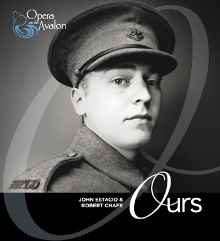
 primephonic, a superior quality classical music platform, designed and developed in the Netherlands by a team of 10 classical music specialists, is now launching in North America. Founded in 2015,
primephonic, a superior quality classical music platform, designed and developed in the Netherlands by a team of 10 classical music specialists, is now launching in North America. Founded in 2015, 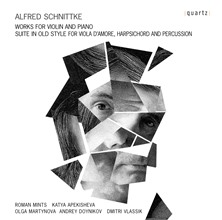
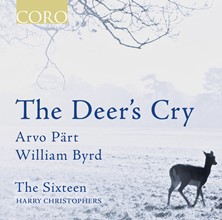
 « Difficile de résister à son charme ! » – The New York Times
« Difficile de résister à son charme ! » – The New York Times
